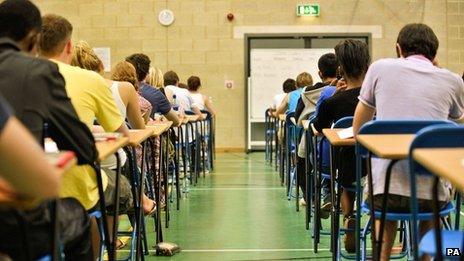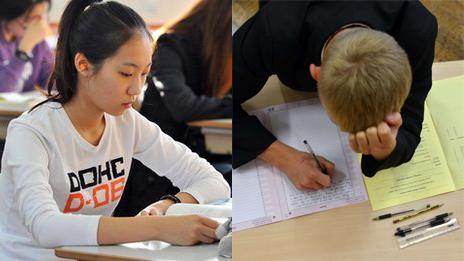OECD 'debunks myth' that poor will fail at school
- Published

The test results of poor pupils in Shanghai match wealthy pupils in the UK
There is nothing inevitable about the weaker academic performance of poorer pupils, says an analysis of Pisa tests by the OECD's Andreas Schleicher.
Mr Schleicher, who runs the tests, says the high results of deprived pupils in some Asian countries shows what poor pupils in the UK could achieve.
The most disadvantaged pupils in Shanghai match the maths test results of wealthy pupils in the UK.
Mr Schleicher says it "debunks the myth that poverty is destiny".
On Monday, Education Secretary Michael Gove said individual schools in England should take Pisa tests, so that they could compare themselves against international standards.
Most deprived
The latest Pisa - Programme for International Student Assessment - test results were published last year by the Organisation for Economic Co-operation and Development, ranking developed countries in terms of how well 15-year-olds performed in tests in reading, maths and science.
This showed the UK as a middle-ranking country, with Asian school systems, such as in Singapore, South Korea and Shanghai and Hong Kong in China, as the highest performers.
But Mr Schleicher's latest analysis compares the performance of the most deprived 10% of pupils.
This reveals how the poorest in many countries overlap with the results of the wealthy in other countries.
The poorest 10% of pupils in Shanghai are as good as the most privileged 20% of teenagers taking the test in the UK and the United States.
In Europe, the Netherlands has the highest-performing pupils from the poorest families.
Poor pupils in the Netherlands are as good at maths as much better-off teenagers in France.
The poorest 10% of pupils in Hong Kong scored at a higher level than the wealthiest in Sweden and Norway.
The very lowest performers among this group were in the Slovak Republic.
Mr Schleicher says it shows how academic differences attributed to social background should not be unquestioningly tolerated.
"We tend to overestimate the impact of poverty," he says .
Social mobility
There was also a challenge to the idea that the UK has an unusually poor record on social mobility.
Dr John Jerrim at the Institute of Education published a study suggesting that in international terms the UK was mid-ranking in the link between family background and future employment opportunities - 17th out of 34 developed countries.
There was greater equity in Scandinavia and some European countries, including Germany and the Netherlands.
But Dr Jerrim said social mobility in the UK was not dissimilar to France, Spain and Italy - and the UK's record was better than some central and eastern European countries.
"Policymakers often state that the relationship between family background and labour market earnings is stronger in the UK than most other countries," he said.
"It is not true that we stand out compared to the rest of world. Policymakers should avoid making such exaggerated claims when discussing this politically sensitive issue."
- Published3 December 2013

- Published4 December 2013

- Published3 December 2013
